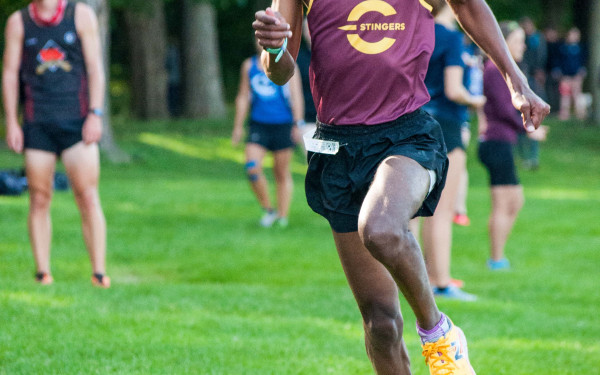Con U Student Prepares for Montreal-Argentina Run
This time next year, most of Concordia’s class of 2013 will be trying to find a job. Joseph Michael Kai-Tsu Liu Roqueni is not most Concordia students.
Upon earning his industrial engineering degree next May, Roqueni will embark on an 18-month, 18,900 km trek from Montreal to Argentina—running the whole way.
“It’s something so big and so crazy that when you tell people they’re just expressionless, you can tell they really don’t believe it,” he said. “But deep down inside I believe that this is going to happen because I’m going to make it happen.”
Born in Ontario, Roqueni—the younger brother of The Expeditioners’ Wang-Tsu from “Today’s Explorers” [Vol. 33, Iss. 11]—moved with his family to Mexico at just seven months old, where he dabbled in a wide array of sports, including soccer, ice hockey, mountain climbing and long-distance running.
It wasn’t until returning to Canada in 2003, however, that he began taking running seriously, eventually joining Concordia’s cross-country team in 2007.
Roqueni has enjoyed the grueling challenge of running kilometre upon kilometre ever since.
“Any runner can tell you that when you’re doing it, the thought of quitting crosses your mind every time,” he said.
“You think, ‘Why am I doing this?’ But when you finish the race it’s so satisfying, and you forget all about the pain.”
Now, Roqueni feels ready for a much greater challenge—specifically, running 50 km a day, five days a week for 18 months from Montreal to Ushuaia, the city at the southern tip of Argentina.
As insurmountable such a feat may seem, Roqueni’s cross-country coach John Lofranco has no doubts about his ability to complete it.
“It’s the kind of thing he’s very capable of doing,” he said. “He’s a passionate guy and is very committed to it.”
If successful, Roqueni’s total run of nearly 19,000 km would still fall well short of the current record of 26,000, set by Jesper Olsen is his 22-month World Run, completed in 2005.
But Olsen had the help of a baby carriage and a support car to store his equipment—Roqueni will be setting off with nothing more than a backpack carrying the bare essentials.
“I want to do something extraordinary that nobody’s ever done,” he said.
To turn that desire into reality, Roqueni first has to prepare his body for a relentless trek across two continents.
In terms of dieting, Roqueni said he needs “a lot of fuel, about 6,000 calories per day,” a goal he’ll accomplish by consuming a wide variety of foods—everything from yogurt, bagels and cereal, to rice, chicken and fish.
Along with lots of cross-country-specific core and strength exercises and stretches, you can guess what the rest of his preparation consists of.
“Just running.”
“I want to do something extraordinary that nobody’s ever done.”
—Joseph Michael Kai-Tsu Liu Roqueni
Roqueni started training at the beginning of August, when he completed the first of three phases that make up his self-made program.
“Phase One was basically starting those long runs, so I started running 20 to 25 kilometres, starting with once a week, then twice a week up to three times a week,” he said.
“It was just feeling, monitoring my body to get used to those brutal distances; at the beginning I was dying of heat, thirst and exhaustion, but after a couple weeks my body started to recover quite fast.”
In Phase Two, which he started in September, Roqueni introduced “doubles,” running 50 kilometres a day—25 in the morning and 25 in the evening—more and more frequently with every passing week.
Phase Three kicks off in January, when he’s “going to be pretty much hitting doubles every [running] day and also with my backpack, because I’m going to be running with one [on the trip].”
If everything goes according to plan, Roqueni will have run over 4,500 km from August through April.
Running so much brings with it growing concerns of injury, but Roqueni said, “That’s what the training is for: to build up strength for the real deal.”
That’s not the only preparation needed, however—proper funding is required as well.
Roqueni estimates the whole expedition will cost about $40,000, and to reach that mark he needs sponsorship—something that has been difficult to obtain.
“I have two sponsors so far, but again this is a project that—because it’s hard to believe—it’s hard for people to say, ‘Okay, I’ll help you out,’” he said.
But Roqueni is confident he’ll get the sponsors he needs by the time he leaves Montreal, at which time he’ll shift his focus from raising money for the trip to raising money from it. Not for himself, though—for others.
“When I started university, I realized that education wasn’t as advanced as other fields, which were evolving so much faster,” he said.
“So I wanted to invest in education. And I thought of doing this in South America, since I’m going there and since it’s, generally speaking, poorer than North America,” he said. “So I wanted to […] bring the [donations received] from people supporting my cause down there so they can use that money to improve their education system.”He is currently in touch with Argentina’s Ministry of Education to determine the best way to invest the donations.
Part of the funds raised will also go toward the Montreal Endurance running club, which Lofranco founded.
“He’s just starting out,” said Roqueni. “And I wanted to help him out to get the funding so that the athletes can just worry about running,” instead of the expenses, which include buying uniforms and registration and travel fees.
A gesture Lofranco is very appreciative of. “It’s helpful,” he said. “As a club, resources can be pretty limited.”
When he returns—whenever that is—Roqueni expects to put his university degree to good use back home in Canada.
Until then, only one objective drives him: Run. Run. And run some more.
Find out more at runningtotheendoftheworld.com

02_900_598_90.jpg)
01_700_1054_90.jpg)



__600_375_90_s_c1.jpg)
_600_375_90_s_c1.jpg)